Downstate Leads Call to End Domestic Helicopter Research, Advocating for Equity-Centered Collaborations
By Office of the President | Apr 30, 2024

SUNY Downstate Health Sciences University released a groundbreaking study titled “Ending Domestic Helicopter Research,” shedding light on the harmful practice of conducting studies in marginalized communities without their meaningful involvement. iCell Press publishes over 50 scientific journals across the life, physical, earth, and health sciences, both independently and in partnership with scientific societies.
I am proud to be among my fellow co-authors, led by W. Marcus Lambert, Ph.D., associate vice president for Research Strategy and Operations, Marlene Camacho-Rivera, Sc.D., MS, MPH, Student Affairs assistant dean and Community Health Sciences assistant professor; Carla Boutin-Foster, M.D., MSc., Institutional Equity associate vice president; and Moro O. Salifu, M.D., MBA, MPH, MACP, Chair of Medicine and Nephrology Division chief, the commentary exposes how this practice, often seen in wealthier institutions, exploits communities of color and resource-limited institutions.
The study emphasizes the need for equitable research practices that prioritize local community involvement to ensure mutually beneficial collaborations when researchers from more privileged institutions or companies conduct studies in or collect data about systemically marginalized communities with little to no involvement of local researchers or community members.

Only 30% of funding from the National Institute on Minority Health and Health Disparities (NIMHD) over the past three fiscal years has gone to resource-limited institutions that serve underrepresented populations.
Domestic helicopter research often exploits communities, such as those of Indigenous Peoples, Black, or Latine groups, as well as resource-limited institutions (RLIs), which are institutions that hold an average of less than $50 million per year of federal funding from the National Institutes of Health (NIH).
Frequently, these RLIs have strong historical ties to disinvested communities but are not given the same financial support as wealthier institutions, thereby limiting the long-term impact of community-academic partnerships.
I strongly support the study’s significance in reaffirming Downstate’s commitment to justice, ethics, and community-centered research. Dr. Salifu echoed this sentiment, emphasizing research’s potential as a catalyst for social change when it prioritizes marginalized communities’ voices and needs and outlines strategies to address health disparities and promote genuine partnerships. This effort is in line with Downstate’s mission to foster inclusivity and equity in research.
The study’s impact extends beyond academia, with implications for broader societal change. Drs. Camacho-Rivera and Boutin-Foster emphasized the importance of challenging power dynamics and prioritizing community empowerment to revolutionize science and medicine.
Downstate’s holistic approach to diversity, equity, and inclusion, as evidenced by its partnerships and educational initiatives, reinforces its commitment to promoting health equity through collaborative efforts with community-based organizations.
Read the press release and study here.